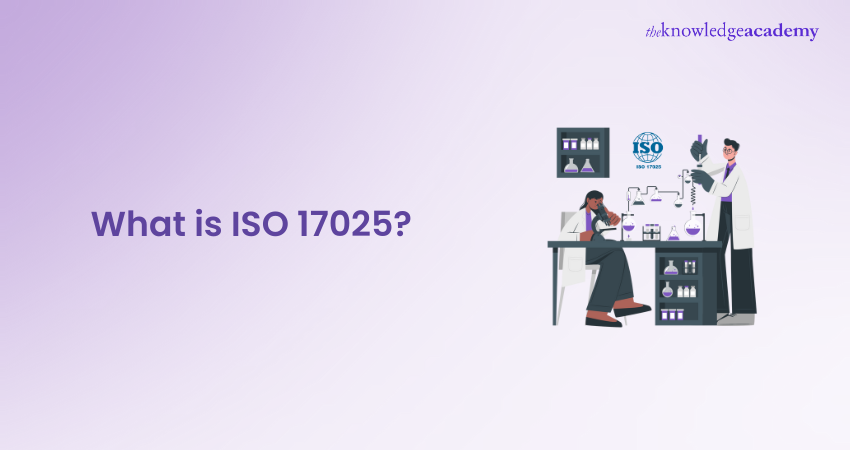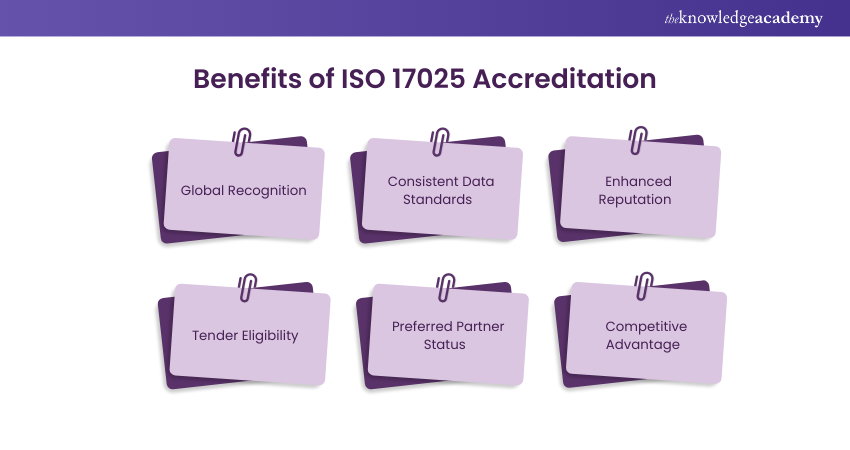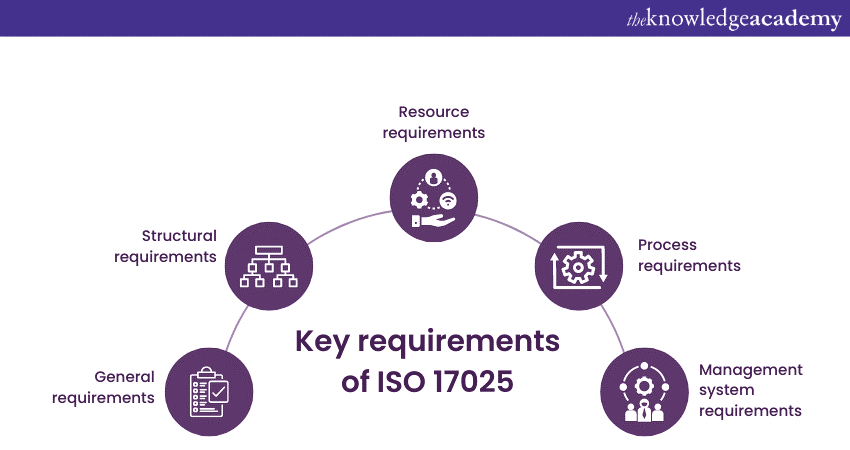We may not have the course you’re looking for. If you enquire or give us a call on +44 1344 203 999 and speak to our training experts, we may still be able to help with your training requirements.
We ensure quality, budget-alignment, and timely delivery by our expert instructors.

Let’s say that you are receiving incorrect lab results that affect a major decision. Doesn’t it sound alarming? That’s why ISO 17025 matters. But What is ISO 17025? It’s the global standard that proves a lab’s competence in testing and calibration. Be it in food, pharma, or manufacturing, accurate results are everything. ISO 17025 is not the backbone of trust and quality in labs? In this blog, we’ll explore its meaning, importance, and real-world impact; simply and clearly.
Table of Contents
1) What is ISO 17025?
2) Benefits of ISO 17025 Accreditation
3) Key Requirements of ISO 17025
4) What is the Certification Process for 17025 Accreditation?
5) What are the Main Changes in the Latest Version of ISO/IEC 17025?
6) Conclusion
What is ISO 17025?
ISO 17025 is an international standard that sets the guidelines for quality and competence in testing and calibration labs. It requires labs to follow high-quality processes and have a reliable Quality Management system to prove their expertise. ISO/IEC 17025 was developed through a collaboration between the International Organization for Standardization (ISO) and the International Electrotechnical Commission.
Ultimately, ISO 17025 Implementation is relevant to any organisation involved in testing, sampling, or calibration that aims to ensure the credibility of its results Simply put, if your work involves producing measurable outcomes, ISO 17025 likely applies to you. Even if your facility isn’t traditionally called a "lab," under ISO 17020 Guide guidelines, it would be considered a laboratory if it produces quantifiable results.
Benefits of ISO 17025 Accreditation
Acquiring ISO 17025 accreditation provides numerous benefits when it comes to test and calibrate laboratories. Understanding the Benefits of ISO 17025 Accreditation is essential, as it enhances a laboratory's credibility, improves operational efficiency, ensures accurate and reliable results, and boosts customer confidence. Here are some of the advantages:

1) Global Recognition
a) The ISO/IEC 17025 Certification ensures adherence to the highest quality standards in testing and calibration.
b) It guarantees reliable and accurate results for clients.
c) It solidifies the lab's credibility in the global marketplace.
d) It significantly elevates the lab's reputation as a trusted player internationally.
2) Consistent Data Standards
a) ISO 17025 makes sure that there's uniformity in testing and calibration processes across all laboratories.
b) It guarantees reliable, repeatable results that meet global standards.
c) It facilitates easy comparison of data from different sources or labs.
d) It strengthens trust and credibility by maintaining consistent quality in data reporting.
3) Tender Eligibility
a) As ISO 17025 accreditation is recognised globally a lab can enjoy increased credibility when applying for tenders.
b) Once it oversees compliance with industry standards, it can your lab eligible for government and private sector contracts.
c) It strongly demonstrates commitment to quality and competence, which is often a requirement for tender eligibility.
4) Preferred Partner Status
a) ISO 17025 boosts reputation as a trustworthy lab, making you a preferred choice for clients.
b) It increases business opportunities by attracting clients who are keen on accredited and certified labs.
c) It provides confidence to stakeholders and makes sure they partner with a lab that meets international standards.
5) Competitive Advantage
a) ISO 17025 will help you differentiate your lab from competitors by showcasing better adherence to international standards.
b) It increases marketability and attracting more clients who seek certified, reliable results.
c) It improves efficiency and consistency, leading to higher quality outcomes compared to non-accredited labs.
Learn to implement ISO Methodologies with our ISO Certification Course today!
Key Requirements of ISO 17025
ISO 17025 sets forth several key requirements that laboratories must fulfil to achieve accreditation. These requirements ensure testing and calibration laboratories' competence, impartiality, and consistent operation. The key requirements of 17025 are divided into the following:

a) General Requirements
It includes two factors - impartiality and confidentiality.
a) Impartiality implies that the laboratory must not prioritise commercial, financial or other benefits to compromise the quality of results.
b) Confidentiality makes sure the laboratory keeps the results and information private.
2) Structural Requirements
This involves employing personnel with appropriate qualifications, experience, and training. They must also ensure the use of validated test methods, proper calibration of equipment, and the availability of necessary resources.
3) Resource Requirements
This includes document control, personnel training, handling of non-conformities, and management review processes
4) Process Requirements
It involves activities such as quality assurance, sampling and reporting results. This ensures accuracy and comparability of test and calibration results.
5) Management System Requirements
These requirements are divided into two options, A and B. Option B will be applicable if a laboratory is part of a large organisation or has its own effective management. On the other hand, if the laboratory’s Quality Management system stays independent of any other management system, option A applies.
Learn to conduct Internal Audit effectively with our ISO 17025 Internal Auditor Course – Register now!
What is the Certification Process for 17025 Accreditation?
The ISO 17025 Certification process involves several steps that laboratories must follow to obtain accreditation. Here’s an overview of the typical certification process:
Step 1: Familiarise yourself with the requirements of 17025. This includes:
a) Understanding the standard and its scope
b) Training all personnel about the management and technical activities
Step 2: Document laboratory activities. It involves documenting the following:
a) Policies
b) Procedures
c) Work instructions
Step 3:Identify areas for improvement and make sure that the laboratory’s processes are functioning effectively.
Step 4: Review the preparedness of your organisation. Before applying for accreditation, your laboratory must meet the accreditation body’s requirements. It means that you need to possess the following:
a) All necessary documents
b) Internal audit programme
c) Records of every management review and method validation.

What are the Main Changes in the Latest Version of ISO/IEC 17025?
The latest version of ISO/IEC 17025, published in 2017, introduced several key changes. These include:
a) Alignment with ISO 9001
b) Incorporation of IT developments
c) Increased emphasis on Senior Management responsibilities
d) Updated Terminology to reflect current laboratory practices
Conclusion
To conclude, think of ISO 17025 as the silent force behind every trustworthy test result. By understanding, What is ISO 17025 and why is it Important, you can turn lab data into dependable decisions. At a time where accuracy drives progress, this standard is what sets credible labs apart.
Gain the skills to implement effective Quality Management systems with our ISO 17025 Foundation Course – Join now!
Frequently Asked Questions
How Does ISO 17025 Differ From ISO 9001?

ISO 17025 prioritises laboratory competency in testing and calibration, whereas ISO 9001 highlights overall Quality Management systems in different sectors.
What Types of Businesses Benefit From ISO 17025 Accreditation?

ISO 17025 accreditation is advantageous for testing and calibration laboratories, research institutions, and Quality Assurance departments as it guarantees dependable, universally acknowledged outcomes.
What are the Other Resources and Offers Provided by The Knowledge Academy?

The Knowledge Academy takes global learning to new heights, offering over 3,000 online courses across 490+ locations in 190+ countries. This expansive reach ensures accessibility and convenience for learners worldwide.
Alongside our diverse Online Course Catalogue, encompassing 19 major categories, we go the extra mile by providing a plethora of free educational Online Resources like News updates, Blogs, videos, webinars, and interview questions. Tailoring learning experiences further, professionals can maximise value with customisable Course Bundles of TKA
What is The Knowledge Pass, and How Does it Work?

The Knowledge Academy’s Knowledge Pass, a prepaid voucher, adds another layer of flexibility, allowing course bookings over a 12-month period. Join us on a journey where education knows no bounds.
What are the Related Courses and Blogs Provided by The Knowledge Academy?

The Knowledge Academy offers various ISO 17025 Training, including the ISO 17025 Foundation, ISO 17025 Lead Auditor, and ISO 17025 Lead Implementer. These courses cater to different skill levels, providing comprehensive insights into the ISO 17025 Checklist.
Our Health & Safety Blogs cover a range of topics related to ISO, offering valuable resources, best practices, and industry insights. Whether you are a beginner or looking to advance your ISO knowledge base, The Knowledge Academy's diverse courses and informative blogs have got you covered.
Upcoming Health & Safety Resources Batches & Dates
Date
 ISO 17025 Foundation
ISO 17025 Foundation
Mon 18th Aug 2025
Mon 24th Nov 2025






 Top Rated Course
Top Rated Course



 If you wish to make any changes to your course, please
If you wish to make any changes to your course, please


